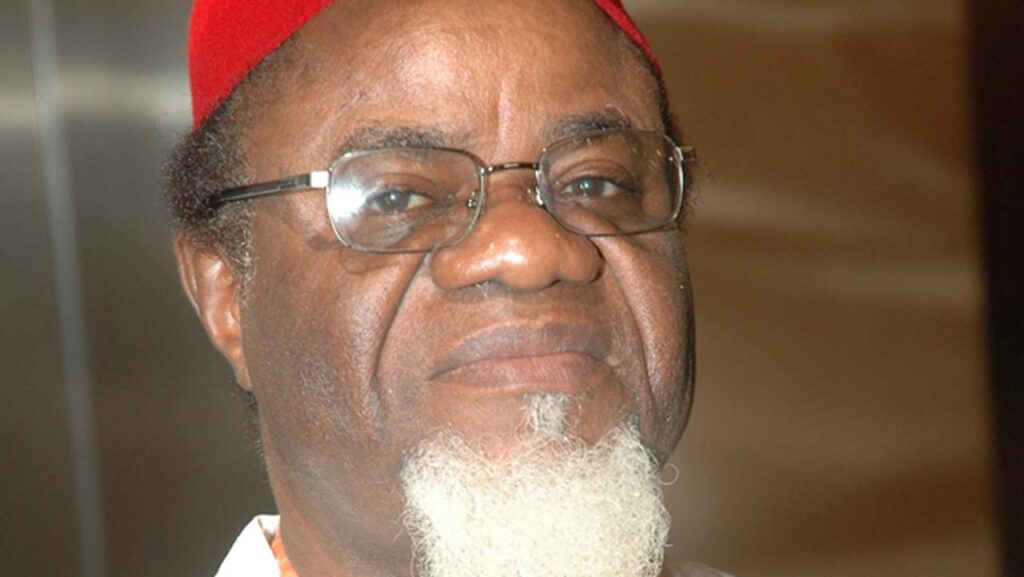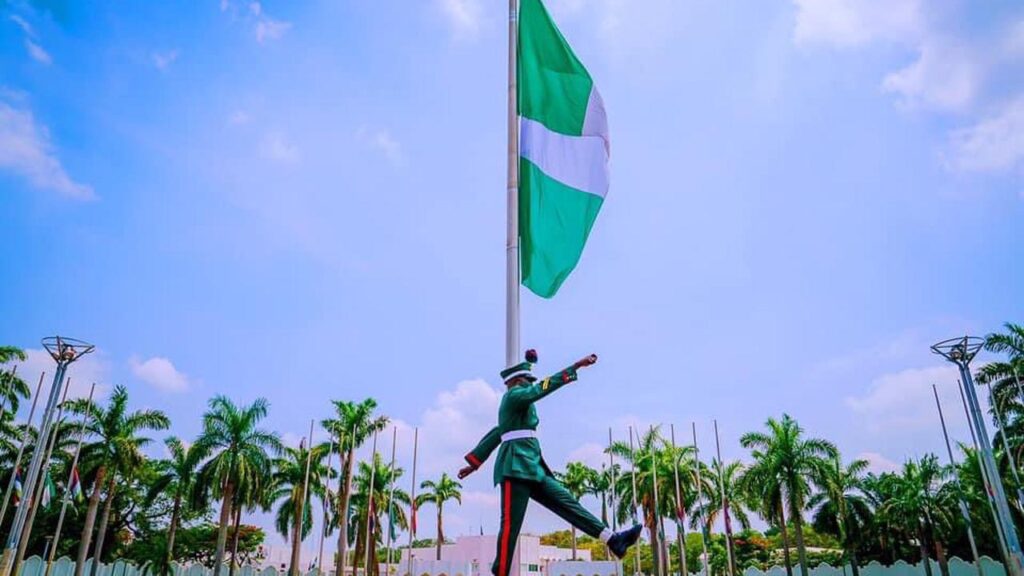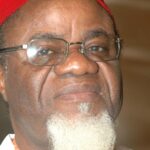
It is said that when Chief (Dr.) Chukwuemeka Ezeife died on December 14, 2023 at the ripe age of 86, Nigeria’s progressive community felt the loss the most, quite apart from his immediate surviving family – the respectable Ezeife dynasty of Igbo-Ukwu in Anambra State. For members of the progressive community, the pain felt from losing Dr. Ezeife did not merely arise from the fact that one of Nigeria’s leading statesmen and most vocal exponent of a better Nigeria had crossed over to the great beyond, but that the political torch he kindled and the big shoes he left behind apparently found no successor for the man fondly called Okwadike Nidgbo.
A few Nigerians tower in political station, character, honesty, candor, principles, discipline, patriotism, commitment to nation-building, humanity, altruism, wisdom, foresight and vision compared to the late Okwadike. Sadly, these few men of his ilk had in the last few years mostly departed to be with their maker, leaving behind a yawning void, possible refilling of which appears to be farfetched. They seem to belong to a generation gone-by, a generation fundamentally removed from that of their immediate successors, not to talk of that of their grand-children and great-grand-children.
In its ranks include the likes of Prof. Ben Nwabueze, Chief FRA Williams, Chief Gani Fawehinmi, Chief Anthony Enahoro, Chief Ayo Adebanjo (still alive), among a few others. This generation to which late Chief Ezeife belonged was witness to Nigeria through its most significant transition moments. In other words, these ones at once knew Nigeria intimately. They knew Nigeria as direct percipients of its epochal transformations from being a British colonial subject to an independent nation; from a war-torn to post-war nation. They knew Nigeria not only during the colonial era, or during the First, Second, Third, and Fourth Republics, as well as during military and civil rules, they also knew Nigeria as active political gladiators in varying capacities as public office holders.
Chief Ezeife, for example, was a Federal Permanent Secretary prior to the Second Republic, a former Anambra State governor during the Third Republic, a political acolyte of late Chief MKO Abiola when the man won the 12 June 1993 presidential election on the platform of the Social Democratic Party (SDP); and Political Adviser to President Olusegun Obasanjo.
He was an Ohaneze leading light and a pro-democracy activist during the heady days of the General Sani Abacha dictatorship. He was critically instrumental to the emergence in 1999 of Chief Bola Tinubu as Lagos State governor on the Alliance for Democracy (AD) platform.
He’d been there and done that. He’d seemingly seen it all, politically speaking. But above all, he was thoroughly educated in the best learning tradition the world could offer. Ezeife was a Harvard-trained Economist, having obtained his Masters and Doctorate degrees in Economics from that rarefied and most prestigious global institution.
As such, Ezeife stood out as a leader of thought. Little wonder President Obasanjo saw him as the fittest and well-heeled for the role of Political Adviser. Neither his voice nor thought (views or perspectives on matters of national significance) was that of the average. He was distinguished. More importantly, he expressed his insights freely, forthrightly, and fearlessly not minding whose ox was gored.
Sadly, his insights on restructuring as the long-term recipe and Igbo presidency as the immediate and short-term panacea for the problems ailing and afflicting Nigeria have hardly prevailed. However, his forthright call for Igbo presidency came close to fulfilment until it was unhappily truncated by the controversial declaration of Chief Tinubu as winner of the 25 February 2023 presidential election.
It is recalled that long before that important election, Chief Ezeife had vociferously advocated for Igbo presidency not because he was an ethnic jingoist. By no stretch of the imagination. On the contrary, it was owing to the inner nudging of his personal ideals which held that national cohesion and progress could only be built on the foundation of justice, equity, balance and fair play. To be sure, Ezeife was as detribalised as any Nigerian, dead or living, could ever be. He fought the 1993 presidential election on the side of Chief MKO Abiola, a Yoruba man, and the presidential flag-bearer of the SDP.
Ezeife, an unbridled promoter of a unified, indissoluble Nigeria, believed that to make Nigeria work in the short-term, Igbo presidency was not just the recipe, it was sine qua non. Indeed, had Dr. Ezife been an ethnic Yoruba or Fulani, he still would have doubtless made the same call, given his untainted belief in national cohesion. In this connection, he was kindred spirits with the likes of Chief Ayo Adebanjo and other Afenifere chieftains who gallantly promoted Mr. Peter Obi (an Igboman) of the Labour Party (LP) for president in 2023.
Although Ezeife pushed for Igbo presidency with his full chest, never was he a separatist. In fact, he ardently believed that the lot of Ndigbo stood to be better served within Nigeria than in a separatist Biafran enclave. He once stated in a media interview in this regard that “For me, although it may be annoying to some people but one Nigeria is the best for the Igbo even with these difficulties.” He further explained, saying: “We have voted with our feet for one Nigeria, and in spite of what the government has been doing to us – excluding us, marginalising us, etc. – many of us, especially the older ones, are still talking about one Nigeria. We know that one Nigeria, properly restructured, will be best even for Fulani.”
Although, Ezeife hardly saw merit in separatism, he didn’t shy away from making a strong case for and spirited effort towards the immediate release of Mazi Nnamdi Kanu, leader of the separatist Indigenous People of Biafra (IPOB). It is on record that he led a group of prominent Igbo leaders on a visit to Aso Rock in Abuja, the Federal Capital, to confer with the then president, General Muhammadu Buhari, on the release of the separatist leader.
But Dr. Ezeife’s progressivism shone the brightest in his decades-long call for the restructuring of the Nigerian polity. Right up to the moment his doctors certified him deceased at the Federal Medical Center in Abuja sometime in December 2023, Ezeife preached restructuring as the long-term remedy for the Nigerian condition. He insisted that only restructuring held for Nigeria the promise of national self-realisation, resurgence and actualisation. More importantly, he was scarcely nebulous in what he meant by restructuring. He clarified that all the major groups in Nigeria are in agreement that restructuring is the way to go otherwise the country had only an unkind future ahead of it.
According to him, the only thorny issue that has hitherto confronted the topic is the resource control question, which according to Ezeife, is entirely distinguishable from restructuring. He said: “No, the North cannot be against restructuring. The North is against resource control. The North is against being denied oil revenue as a result of resource control. And they think resource control is the dominant factor in restructuring, which is not so.
“We want to have all those clamouring for Biafra, Oduduwa Republic, and others in Nigeria, and nowhere else. How do we achieve this? This is by giving fair independence to regional governments. If you have been doing something and it is working, eventually you will start another that is not working; the best thing to do then is to go back to what was working. This means going back to regional government, where members of the region are in control.
“Government should ensure that every necessary action for restructuring, including referendum, should be concluded. People who wish Africa well and believe in one Nigeria should work for the realisation of the above. The fear is that time may be running out.
“I am happy that some who opposed restructuring, who had said their part of Nigeria is ready for Nigeria’s disintegration, seem to be having a rethink. We should indeed make haste to restructure this country.”
On how restructuring will affect the current states system, Dr. Ezeife explained: “We do not have to reinvent the wheel, we need only note that states are facts of our system. It may be convenient to use our existing six geographical zones as the federating units. Indeed, the states in each zone should work out a quasi-federal constitution, agreeable to all of them. We should not dwell on this. Because time is running out, we should call on the government to set up a body to work out details of the structure of a new Nigeria, which should be truly federal.
“If there is restructuring and agreement is reached and regions are on their own, we will see things happening. There will be improvement for Arewa, Yoruba, Ijaw, Itsekiri, Igbo, etc, and for Nigeria. I believe that God in heaven may change the situation.”
•Prince Okey-Joe Onuakalusi is the Member representing Oshodi/Isolo Federal Constituency at the Federal House of Representatives, Abuja.












